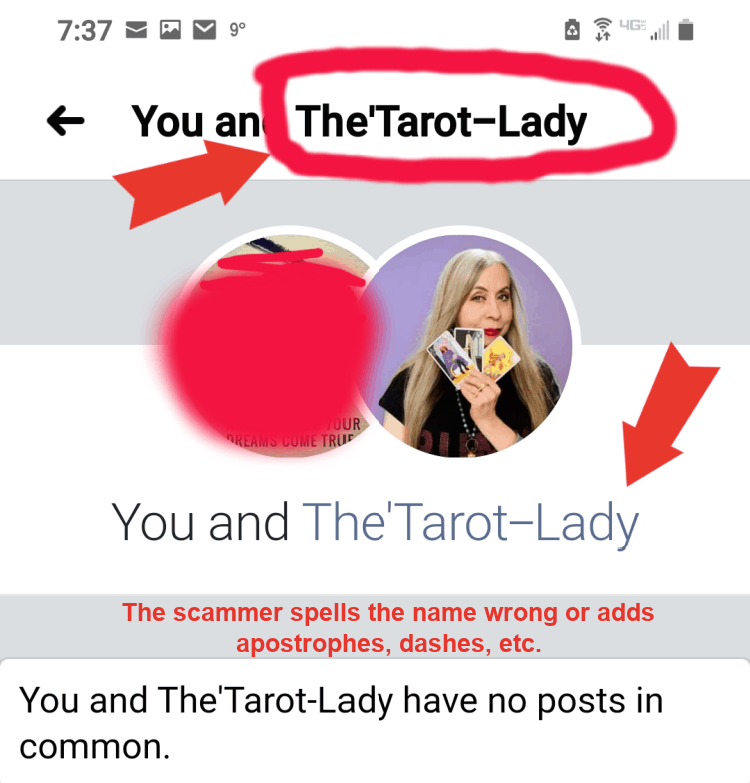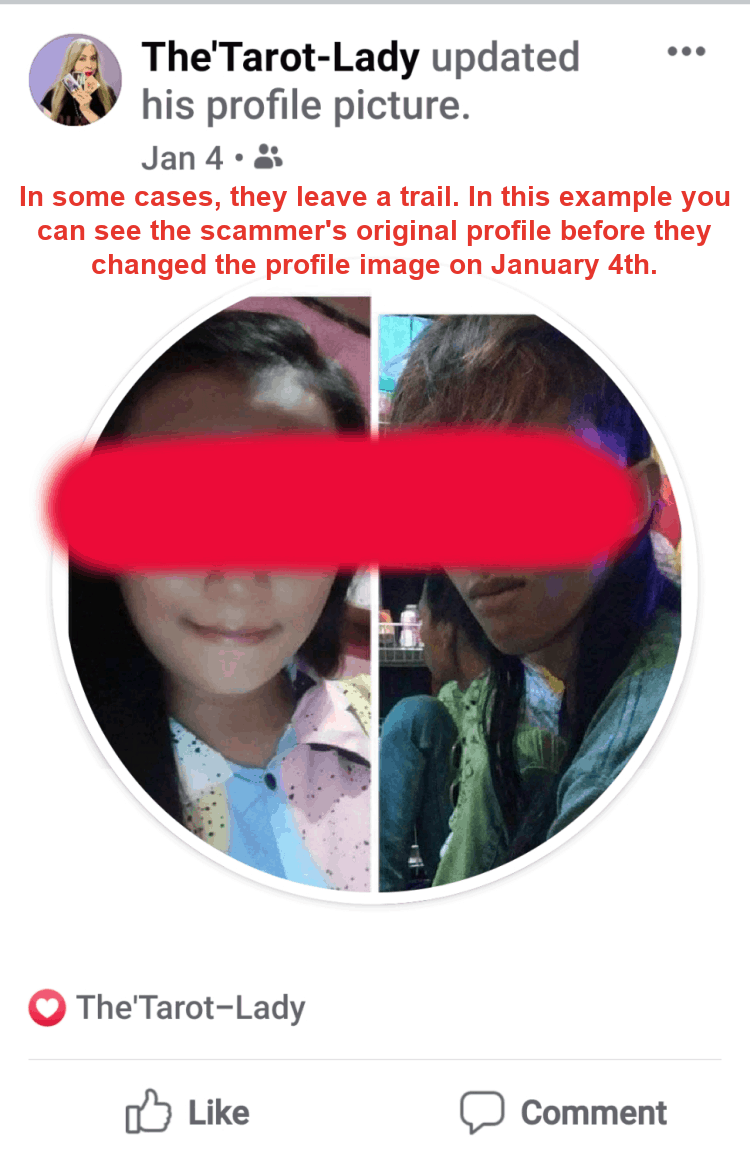
Every day, there are people on the internet stealing the identities of public figures for scamming purposes. Celebrities aren’t the only victims – social media scammers target members of the military, small businesses, and ordinary folks too. It’s probably safe to say that every one of us knows someone who has their online identity poached for nefarious reasons.
Lately, there has been a rash of internet thieves stealing the social media identities of tarot readers and astrologers. They do this with one purpose in mind: to rip off the fans, followers, and clients. Sometimes, the business owner is none the wiser until a victim reaches out and alerts them.
Recently, I had one of these scambags (credit for that clever name goes to Vic DiBitetto – listen to what he has to say about this) show up on Facebook – and thanks to my followers, we learned what they were up to – and stopped them before they could do real harm to unsuspecting fans.
This incident inspired me to write this post. I’m going to share what consumers need to know to avoid getting scammed. I’ll also share my best advice for taking these con artists off the internet. But first, here are some images from my recent situation (my comments in red).
Here is the fake social media profile pretending to be me. As you can see, the name isn’t The Tarot Lady – the apostrophe and dash give it away.

If you do a little digging, you’ll see that the con artist “updated” his profile picture to MINE on January 4th. Also: it’s a HE, while I’m a woman. You can also see the old profile pic before he stole mine!

Here’s a conversation the bogus Facebook profile had with a follower. Note the punctuation issues and the weird way they are talking. NO tarot reader would say “lecture about your future.” Also, note that the link goes to a movie site and the con artist tries to get the follower to enter their info, claiming they are “sponsored” by a movie site. THAT DOESN’T MAKE SENSE. An authentic tarot pro would have their own website.

Alright, now that you know how it looks, here’s some helpful info.
First, let’s talk about how the scam works.
- The thief finds a social media profile that looks popular. They take enough images to create a fake profile, including the avatar and headers.
- Next, they create a similar name for the fake social media profile – but because the original name and URL are taken, they can’t do a direct copy. Hence, the fraud will have misspellings or odd changes in the profile name (ex: weird apostrophes, dashes, or underscores).
- Once the fake profile is up, they go through the followers of the real profile and start following them or sending friend requests.
- From there, it’s time to scam! The thief sends DMs (direct/private messages) to unsuspecting followers asking if they want a tarot or astrology reading.
- If someone responds, they are sent to a bogus site or asked for money via a PayPal link, Venmo, CashApp. In some cases, they will request a wire transfer – or gift cards. If you take the bait, you’re out of money.
If you’re a consumer, here’s what you need to look for:
- A misspelled or odd iteration of a public figure’s name. If it looks weird, be suspicious immediately.
- Low follower count. Because these fake profiles pop up frequently, they usually don’t have enough time to gather a large audience. If it’s a popular person but no followers/fans – that’s a huge red flag.
- No blue checkmark. A blue checkmark can indicate a legit biz/person. BUT some folks (like yours truly) don’t have one…yet. While a lack of a blue checkmark isn’t necessarily a bad thing, having one does help the consumer know it’s the real deal – and protects the public figure too.
- They are soliciting you for business via direct/private messages on social media. A legit business owner will NOT slide into your DM’s to solicit.
- When the scammer sends private messages, it may seem “off” in some way. For example, there may be misspellings or it may not sound like the person they are imitating. (Red flag: if they use the word “ma’am” to address you, be on high alert.
- If you ask them basic questions that might identify them as the real person, they cannot answer. You should test them with a trick question.
- They might direct you to a website – but if you go there, it doesn’t look like the real site. It may not work properly or it may take you to another site that doesn’t make sense at all.
- They might ask for money via an odd PayPal link, CashApp, Venmo, or wire transfer (HUGE red flag). Sometimes, they’ll ask for gift cards. BIG NOPE.
- If you’ve been victimized, file a report with the FBI. You can file a report here.
What to do if you’re a consumer/friend/fan/follower:
- Keep your wits about you – and use common sense. If it doesn’t look right, trust your gut – and do some research.
- Report them immediately. Here’s how to do that on Facebook and Instagram.
- Contact the real person and alert them right away.
- If you accept a friend request and the scammer contacts you, keep screenshots of your conversation and send them to the real person.
- Do NOT give them money or any personal information. Do NOT give your credit card number nor should you go to Apple and buy gift certificates.
- Block the scammer so they cannot bother you again.
If you’re a tarot reader, astrologer, small business, or public figure, here’s what you need to do:
- If you’re active with social media, that’s in your favor. An active account will show real-life engagement, something the social media sites will want to see. This is a good reason to create plenty of content!
- Apply for the blue checkmark where you can (as of this time, I still don’t have one). This will protect you and your followers. It shows you’re the real deal.
- If someone alerts you to a fake profile, get screenshots of everything immediately. If they have created a phony website, you’ll want screenshots of those two. ALWAYS keep a paper trail.
- Do a bit of research. See if you can find any identifying information. For example, sometimes you can see when they’ve changed their profile names – and you might be able to get their real name or picture (see my example).
- If your followers engage in conversations with these people, ask them to get screenshots of the communication. You might want to encourage a trusted person to feign interest and start a private chat with them to get more intel. Again: screenshot everything.
- Contact Instagram or Facebook. Here’s how to report: impersonation – or copyright/intellectual infringement on Facebook and Instagram. I have found that filing a copyright infringement report works faster than an impersonation report.
- Ask your followers and fans to report the account.
- If they stole your headshot, reach out to your photographer and have them file a copyright infringement report.
- If they’ve created a fake website, file a DMCA with their web host. The Artist’s J.D. wrote a great blog post on this: How to send a DMCA Takedown Notice.
- Internet fraud is taken seriously by the FBI. You can file a report here.
- Keep an eye on it until it’s gone.
One more scam to watch out for:
If you have a tarot, astrology, or any sort of metaphysical social media page, you’ll need to keep an eye on scammers who show up in the comments, claiming a “spellcaster” brought back their lost love. These comments include contact info. Sometimes these types will respond directly to someone else’s comment trying to solicit business. If you find those on your pages, follow this formula: report, ban, delete the comment.
Dealing with these online crooks can feel exhausting. But it’s important for your business – and consumers – to take these scums off the world wide web as fast as they are found. Until the social media companies figure out how to prevent this fraudulent stuff from happening in the first place, business owners and consumers need to be vigilant and ready to take action.
Together, we can stop them right in their dirty tracks.
xo
Theresa
© Theresa Reed | The Tarot Lady 2021
A few posts that might help you:
Handling Online Plagiarism Without Losing Your Cool…or Your Spirit
DMCA Notice: Everything You Need to Know
From the FTC: Scams that start on social media.
From the office of the Minnesota Attorney General: Social Media Scams
From AARP: Scams Spike on Instagram, Other Social Media Sites Amid COVID-19.

 I’m Theresa Reed (aka, The Tarot Lady). I’ve been a full-time tarot reader for 30+ years — which, in my industry, makes me pretty badass.
I’m definitely not your average Tarot expert — I drop the F-bomb, I quote rappers, and I’m obsessed with pop culture + reality TV. Folks come to me for straight-talk + tough-love — without the woo-woo fluff.
I’m Theresa Reed (aka, The Tarot Lady). I’ve been a full-time tarot reader for 30+ years — which, in my industry, makes me pretty badass.
I’m definitely not your average Tarot expert — I drop the F-bomb, I quote rappers, and I’m obsessed with pop culture + reality TV. Folks come to me for straight-talk + tough-love — without the woo-woo fluff.
You must be logged in to post a comment.